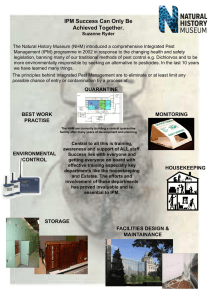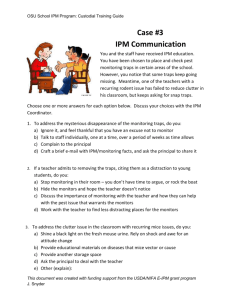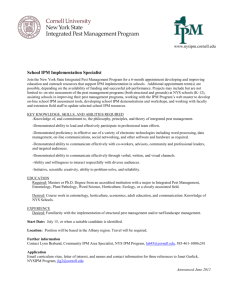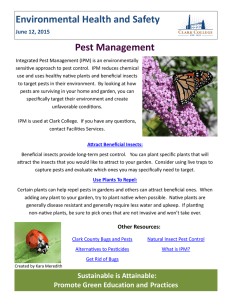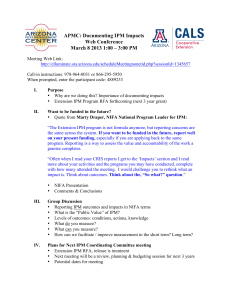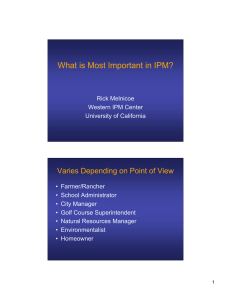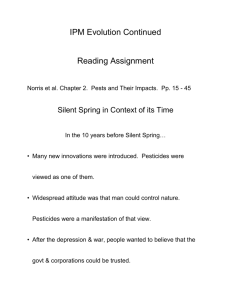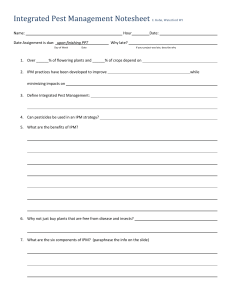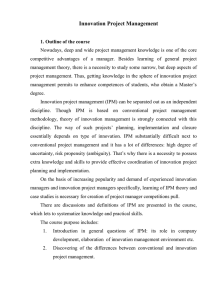Stop School Pests: Standardized National School IPM Training Stop School Pests Team
advertisement
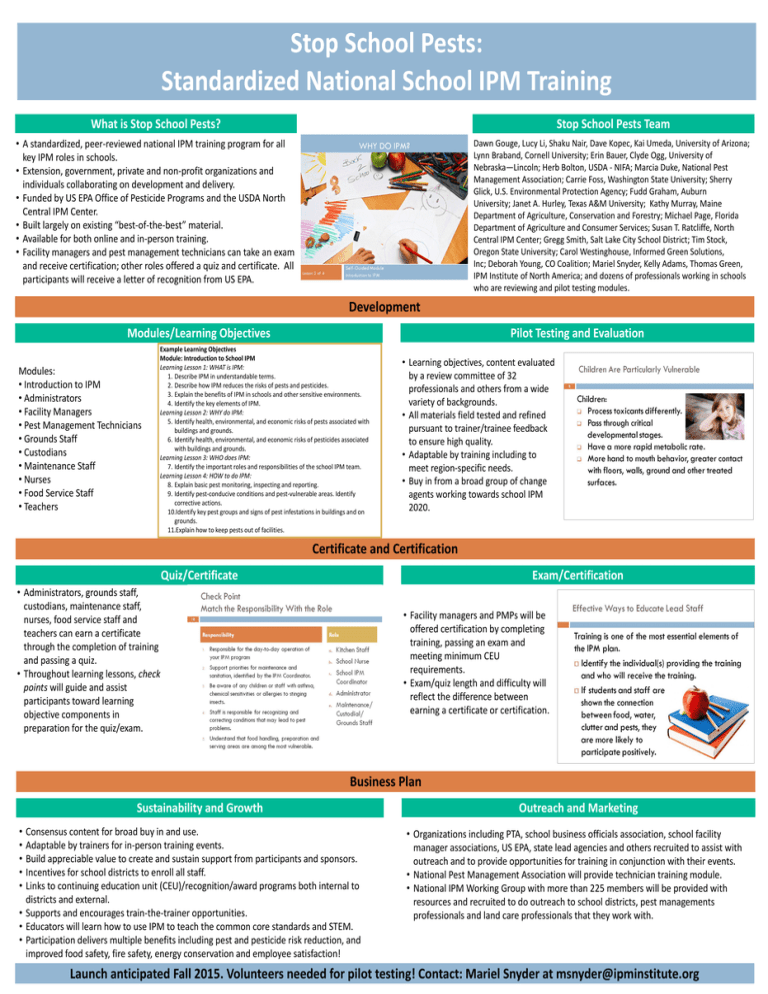
Stop School Pests: Standardized National School IPM Training What is Stop School Pests? Stop School Pests Team • A standardized, peer-reviewed national IPM training program for all key IPM roles in schools. • Extension, government, private and non-profit organizations and individuals collaborating on development and delivery. • Funded by US EPA Office of Pesticide Programs and the USDA North Central IPM Center. • Built largely on existing “best-of-the-best” material. • Available for both online and in-person training. • Facility managers and pest management technicians can take an exam and receive certification; other roles offered a quiz and certificate. All participants will receive a letter of recognition from US EPA. Dawn Gouge, Lucy Li, Shaku Nair, Dave Kopec, Kai Umeda, University of Arizona; Lynn Braband, Cornell University; Erin Bauer, Clyde Ogg, University of Nebraska—Lincoln; Herb Bolton, USDA - NIFA; Marcia Duke, National Pest Management Association; Carrie Foss, Washington State University; Sherry Glick, U.S. Environmental Protection Agency; Fudd Graham, Auburn University; Janet A. Hurley, Texas A&M University; Kathy Murray, Maine Department of Agriculture, Conservation and Forestry; Michael Page, Florida Department of Agriculture and Consumer Services; Susan T. Ratcliffe, North Central IPM Center; Gregg Smith, Salt Lake City School District; Tim Stock, Oregon State University; Carol Westinghouse, Informed Green Solutions, Inc; Deborah Young, CO Coalition; Mariel Snyder, Kelly Adams, Thomas Green, IPM Institute of North America; and dozens of professionals working in schools who are reviewing and pilot testing modules. Development Modules/Learning Objectives Modules: • Introduction to IPM • Administrators • Facility Managers • Pest Management Technicians • Grounds Staff • Custodians • Maintenance Staff • Nurses • Food Service Staff • Teachers Pilot Testing and Evaluation Example Learning Objectives Module: Introduction to School IPM Learning Lesson 1: WHAT is IPM: 1. Describe IPM in understandable terms. 2. Describe how IPM reduces the risks of pests and pesticides. 3. Explain the benefits of IPM in schools and other sensitive environments. 4. Identify the key elements of IPM. Learning Lesson 2: WHY do IPM: 5. Identify health, environmental, and economic risks of pests associated with buildings and grounds. 6. Identify health, environmental, and economic risks of pesticides associated with buildings and grounds. Learning Lesson 3: WHO does IPM: 7. Identify the important roles and responsibilities of the school IPM team. Learning Lesson 4: HOW to do IPM: 8. Explain basic pest monitoring, inspecting and reporting. 9. Identify pest-conducive conditions and pest-vulnerable areas. Identify corrective actions. 10.Identify key pest groups and signs of pest infestations in buildings and on grounds. 11.Explain how to keep pests out of facilities. • Learning objectives, content evaluated by a review committee of 32 professionals and others from a wide variety of backgrounds. • All materials field tested and refined pursuant to trainer/trainee feedback to ensure high quality. • Adaptable by training including to meet region-specific needs. • Buy in from a broad group of change agents working towards school IPM 2020. Certificate and Certification Quiz/Certificate Exam/Certification • Administrators, grounds staff, custodians, maintenance staff, nurses, food service staff and teachers can earn a certificate through the completion of training and passing a quiz. • Throughout learning lessons, check points will guide and assist participants toward learning objective components in preparation for the quiz/exam. • Facility managers and PMPs will be offered certification by completing training, passing an exam and meeting minimum CEU requirements. • Exam/quiz length and difficulty will reflect the difference between earning a certificate or certification. Business Plan Sustainability and Growth • • • • • Consensus content for broad buy in and use. Adaptable by trainers for in-person training events. Build appreciable value to create and sustain support from participants and sponsors. Incentives for school districts to enroll all staff. Links to continuing education unit (CEU)/recognition/award programs both internal to districts and external. • Supports and encourages train-the-trainer opportunities. • Educators will learn how to use IPM to teach the common core standards and STEM. • Participation delivers multiple benefits including pest and pesticide risk reduction, and improved food safety, fire safety, energy conservation and employee satisfaction! Outreach and Marketing • Organizations including PTA, school business officials association, school facility manager associations, US EPA, state lead agencies and others recruited to assist with outreach and to provide opportunities for training in conjunction with their events. • National Pest Management Association will provide technician training module. • National IPM Working Group with more than 225 members will be provided with resources and recruited to do outreach to school districts, pest managements professionals and land care professionals that they work with. Launch anticipated Fall 2015. Volunteers needed for pilot testing! Contact: Mariel Snyder at msnyder@ipminstitute.org
